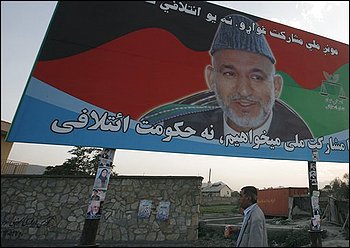Accusations Of Vote Fraud Multiply in Afghanistan
Complaints on All Sides Threaten to Discredit Result, Hinder U.S. Policy

|
Discussion Policy
Comments that include profanity or personal attacks or other
inappropriate comments or material will be removed from the site.
Additionally, entries that are unsigned or contain "signatures" by
someone other than the actual author will be removed. Finally, we will
take steps to block users who violate any of our posting standards,
terms of use or privacy policies or any other policies governing this
site. Please review the full rules governing commentaries and discussions. You are fully responsible for the content that you post.
|
Friday, August 28, 2009
MAZAR-E SHARIF, Afghanistan -- One week after Afghanistan's presidential election, with the winner still undeclared, increasing accusations of fraud and voter coercion threaten to undermine the validity of the results, deepen dangerous regional divisions and hamper the Obama administration's goals in this volatile country.
With U.S. popular support for the war in Afghanistan wavering, an election viewed as illegitimate by many Afghans would be a major setback for President Obama, who has increased U.S. military and economic efforts in a conflict central to his foreign policy. Officials worry that a Kabul government tainted by allegations of election-stealing or destabilized by a potentially violent backlash could derail U.S. efforts to beat back a resurgent Taliban and build Afghan security forces.
In interviews here in the capital of Balkh province in northern Afghanistan, the governor, election officials and residents described incidents of ballot-box stuffing and voter intimidation, particularly by election monitors. The many allegations of fraud add to the chorus of doubts from candidates and observers in other parts of the country about the fairness of the election process.
In a jailhouse interview, election monitor Abdul Hakim Ghafurzai, bruised and bloodied and slumped in his cell, said he knows how it feels to challenge election fraud in Afghanistan. "I am in pain," said Ghafurzai, who alleged he was beaten and arrested after complaining that police outside this northern city shut down polling places because people were voting for President Hamid Karzai.
"Fraud has taken place by the Independent Election Commission, and there were also many threats," said Atta Mohammad Noor, the governor of Balkh, who broke with Karzai before the election and backed his main rival, Abdullah Abdullah, who is very popular in the north. "If this government wins through fraud, I won't be with this government."
All five leading candidates have filed complaints of ballot-box stuffing or destruction, intimidation and pressure on voters at polling stations, and ballots cast by phantom voters. One candidate, former anti-drug official Mirwais Yasini, personally delivered boxes full of shredded ballots to the foreign-led Election Complaints Commission. Yasini and five other candidates issued a joint statement this week saying the election was marred by "widespread fraud and intimidation" that threatened to "increase tension and violence in the country."
Because the complaint process is slow and cumbersome, officials at the complaints commission office in Kabul said they do not expect to finish their investigations until mid-September, at least two weeks after the official election results are announced. That could create public tension and possible unrest, especially if Karzai is announced as the winner before the numerous complaints have been resolved.
Karzai and Abdullah have denied allegations that their followers committed systematic fraud.
In the past week, Abdullah has held two news conferences to allege "widespread rigging" by the Karzai administration, its campaign aides and employees of the Independent Election Commission. He has shown reporters thick blocks of ballots with identical check marks next to Karzai's name and photograph, and shown videos of people sitting on the floor in closed polling stations and systematically marking ballot after ballot.
Legislators and other leaders in a number of provinces, especially those threatened by insurgent violence such as Kandahar, Khost and Wardak, have complained that at polling stations where very few people were able to vote because of insecurity, sealed ballot boxes inexplicably full of hundreds of ballots were sent to Kabul.
Election observers have described northern Afghanistan as a place where the election proceeded relatively peacefully, with as many as half of registered voters going to the polls -- far more than in some Taliban strongholds in the south. But interviews with those monitoring the election here and looking into allegations of irregularities painted a bleaker portrait that implicated the followers of both Karzai and Abdullah.
"I was a witness to fraud, and I couldn't do anything to stop it," said a female election monitor at a voting site in Barga village, in this province, who spoke on the condition of anonymity. She said her fellow staff members voted at least 100 times for Abdullah and forced other residents to make the same choice. "I was really upset. The voting system was not good. People didn't have the right to choose," she said.


 Why Do I Have to Log In Again?
Why Do I Have to Log In Again? Discussion Policy
Discussion Policy



